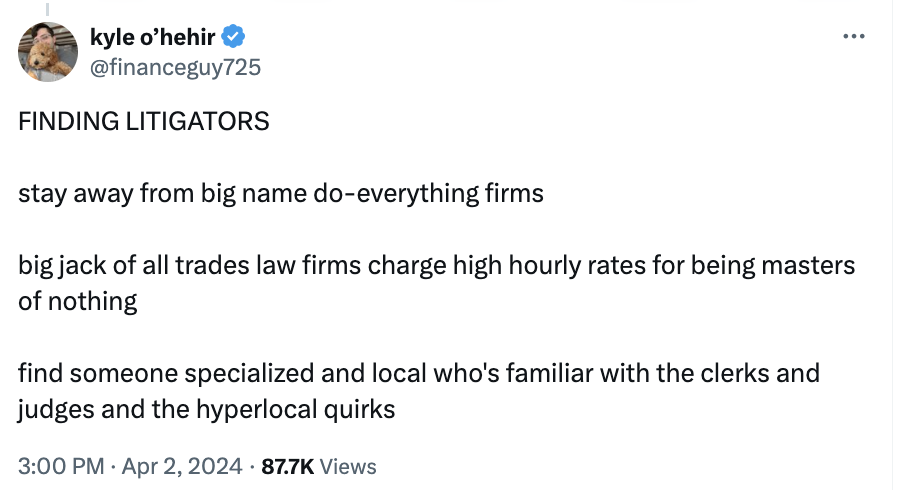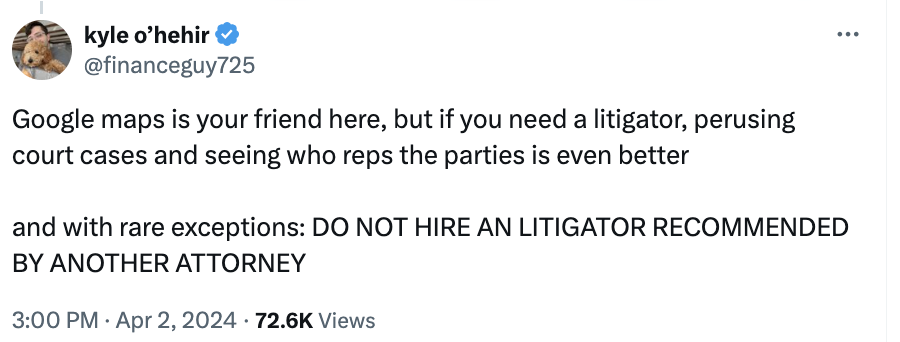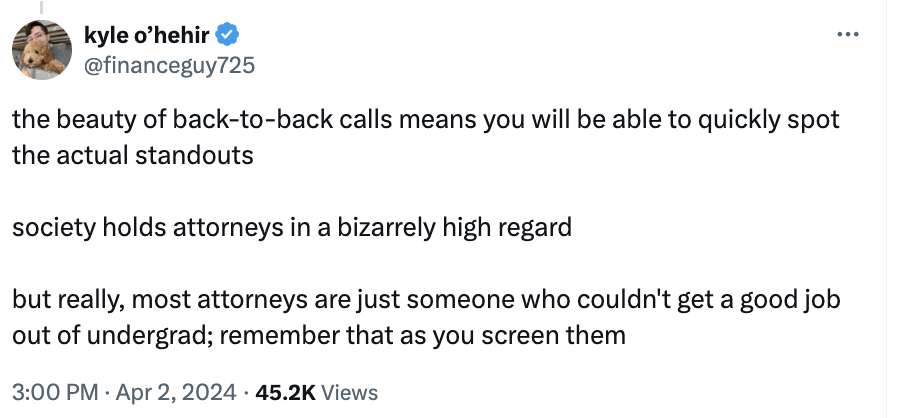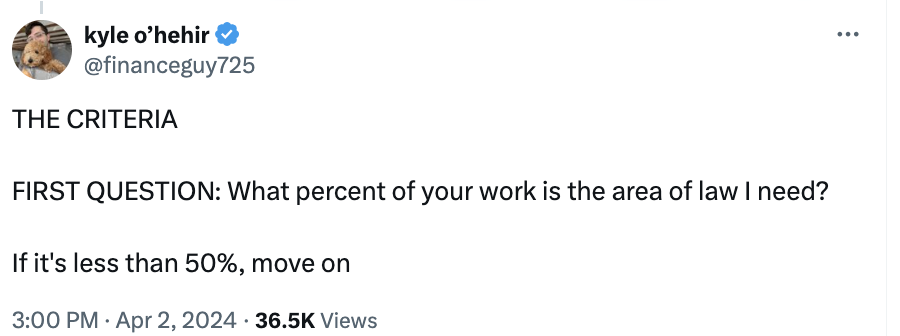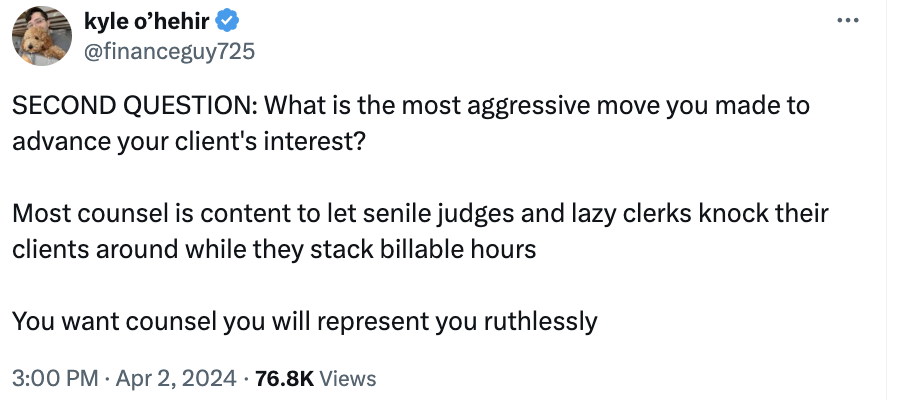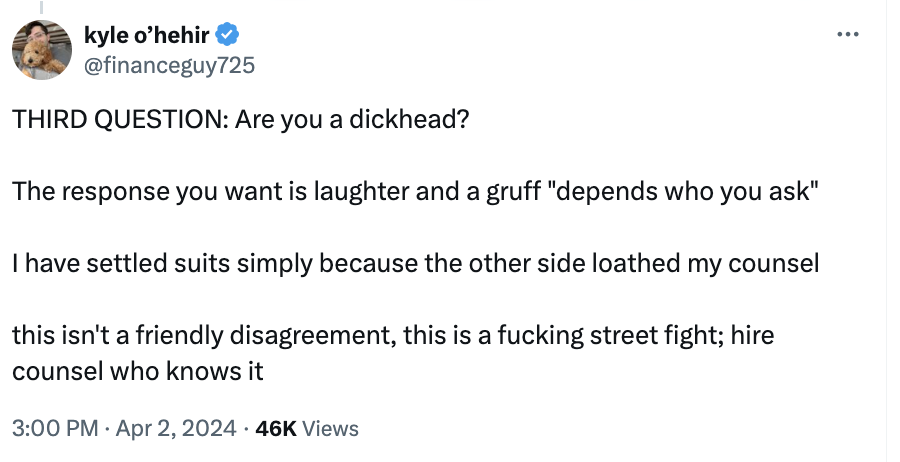[ad_1]
 Twitter lost a lot of its credibility when Elon Musk transformed the “Blue Checkmark” from a signal of identity and expertise to a $96 mercenary badge for thirsty edgelords, but it’s more than made up for it in unintentional comedy. And racism. But let’s focus on the comedy for the moment.
Twitter lost a lot of its credibility when Elon Musk transformed the “Blue Checkmark” from a signal of identity and expertise to a $96 mercenary badge for thirsty edgelords, but it’s more than made up for it in unintentional comedy. And racism. But let’s focus on the comedy for the moment.
Before Musk’s tenure, we may never have seen blue checked user @financeguy725 rack up almost 900,000 views (and counting!) sharing his streetwise advice on hiring good lawyers. But now he’s verified and his finance guy thoughts on how much smarter finance guys are than the dumb lawyers enjoy enhanced visibility. Bless the Musk!
If the attorney’s client relationship is with the partner specifically (or with the partnership and there’s any question as to the authority of another partner to act independently on behalf of the partnership) then this is… correct? In fact, if the lawyer considered themselves fired by some rando eating pizza without hearing from the actual client contact that would be a way worse sign.
Anyway, this thread went on and it did not get any smarter but it did get way funnier.
“Admittedly, Your Honor, we failed to meet the discovery deadlines and most of our summary judgment motion was written by ChatGPT, but let the record reflect that the motion was in your preferred Arial font!”
Small and mid-sized local firms are filled with excellent attorneys and are more than capable of handling “specialized and local” matters at a lower price point. But if you’re involved in the sort of case that has you even thinking about a Biglaw firm, you probably need a Biglaw firm. Because if you’re in that position, you’re looking at a national scope, brute force, bet-the-company litigation that those firms are built to handle.
Also, unless the matter is pending in the firm’s homefield, a Biglaw firm is going to hire local counsel anyway so what in the hell is he even talking about?
But, sure, “don’t hire Cravath for your $500 spat with a vendor” is decent advice. We’ll give him partial credit here.
Now he’s going to praise Google Maps as a search method, so get out there and — if your jurisdiction allows it — snag “Law Firm Near Me” fast.
Wait.
What?
Why?
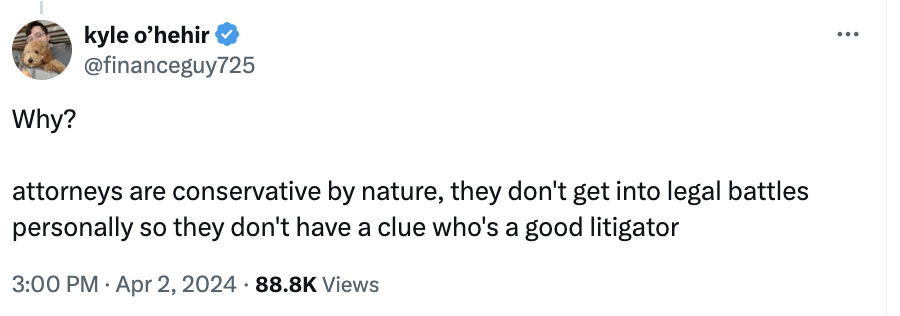
This is like saying you should trust BBQ to someone who orders Chili’s Baby Back Ribs once a year over a competition circuit pitmaster.
Litigators are involved in legal battles personally every day. Assuming this isn’t a criminal matter — and we’re giving the author the benefit of the doubt that he’s not addressing the scenario where the FBI’s already shown up — then the same clutch of litigators are working with each other and against each other all the time. They know exactly who is and isn’t good at this because they’re staring at everyone else’s work product all the time.
He then offers some decent advice about talking to multiple attorneys before settling on one, which is just simple comparison shopping. But…
Yes, those with impeccable academic credentials and excellent standardized testing are famously unable to get a good job out of undergrad.
But there’s a theme to be had here: if you come at the legal industry without a basic grasp of what lawyers do, looking to hire a cheap avatar who’ll slap your threats under fancy letterhead, then you would think lawyers are held in bizarrely high regard.
My first question: does the client even know what area of law they might need? It’s a serious question that this checklist glosses over.
If you want a litigator and hire someone who does 90 percent trusts and estates then, sure, you’ve screwed up. But also the attorney screwed up in that case because they shouldn’t ethically take matters they aren’t competent to handle.
On the other hand, holding out for a litigator who only handles some niche area, is not only unnecessary, it might be counterproductive if there’s nothing idiosyncratic about the subject. You’ve just shrunk the available talent pool over a legally inconsequential distinction.
Any answer to this question that will satisfy this guy will also one day be paragraph one of a disciplinary complaint.
On that note…
Of all the bad advice, this might be the worst. Attorneys don’t cave because they dislike opposing counsel. More often than not, unpleasant counsel makes the other side more recalcitrant.
This is just a warmed over version of Donald Trump’s Roy Cohn fixation and the problem with the Roy Cohn model is that it only works when the stakes are sufficiently low. Cohn could bully anyone who wasn’t sufficiently motivated to contest the matter. If, as the author puts it, “this is a fucking street fight” then the other side is not going to just going to methodically break your “fighter” attorney and then file for sanctions. And the “senile judges and lazy clerks” will grant them because they’re just as pissed off.
In the original poster’s defense, his bio says he does “distressed real estate credit” which feels like a lane where bravado might get adversaries to crumble fast. And there’s certainly a value to that. Outside of that context though, consider screening attorneys… basically any other way.
 Joe Patrice is a senior editor at Above the Law and co-host of Thinking Like A Lawyer. Feel free to email any tips, questions, or comments. Follow him on Twitter if you’re interested in law, politics, and a healthy dose of college sports news. Joe also serves as a Managing Director at RPN Executive Search.
Joe Patrice is a senior editor at Above the Law and co-host of Thinking Like A Lawyer. Feel free to email any tips, questions, or comments. Follow him on Twitter if you’re interested in law, politics, and a healthy dose of college sports news. Joe also serves as a Managing Director at RPN Executive Search.
[ad_2]




